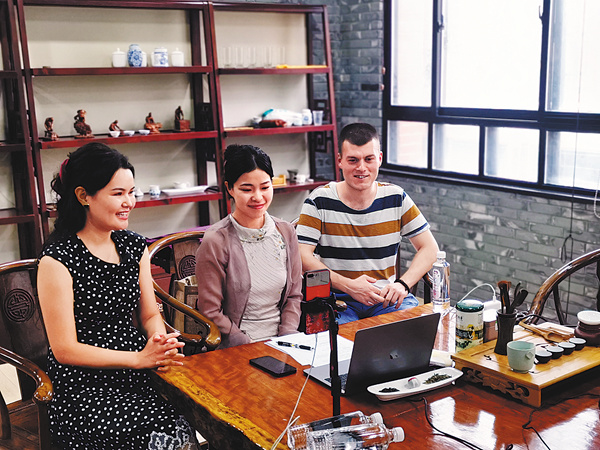

International students take advantage of scholarship program that aims to nurture Chinese-language teachers, Cao Chen reports in Shanghai.
Katsiaryna Malyshava from Belarus might have never tried livestreaming, given that the 31-year-old works as a freelance translator, until she attended an online competition while participating in a Chinese-language teachers scholarship program for international students at East China Normal University.
The livestreaming competition allowed each student in the program to present and "sell" a product from their own countries, in Chinese, to the judges.
Malyshava, who presented a chopping board with wood carvings on one side as both a piece of art and a kitchen tool, won the first prize.
"I liked appearing in front of the audience as a livestreamer, showing my natural theatrical abilities and speaking Chinese. It was then that I realized that the language brings together people and cultures from across the world. Presentations of other students were splendid as well," says Malyshava, who completed the one-year program in December.
The competition reveals the program's core aim to be a "multicultural exchange platform for global people to learn Chinese culture", according to Huang Meixu, director of the International Education Center at the university.
A total of 922 expats from some 40 countries, including Japan, Russia and Thailand, attended the program initiated by the Ministry of Education's center for language education and cooperation in 2021.Over 500 students have been admitted for the next semester, starting in spring, at the university.
Other domestic universities offering such programs include Beijing Language and Culture University and Beijing Normal University.
According to East China Normal University, most students have at least one year's experience of learning Chinese in schools, universities or Confucius Institute branches in their home country.
Under the circumstances of the COVID-19 pandemic, students learn from home and take courses covering language skills, newspaper-reading and culture, in either live or prerecorded forms.
"Besides language skills, experts in Chinese folklore and social economics give lectures to expose the students to domestic communities and people," Huang says.
At first, the online education method was Malyshava's biggest concern, as she didn't trust that through e-learning, which may require strong motivation and lack interpersonal communication, one can learn anything. She started to learn Chinese in 2009 as an exchange student in Nankai University in Tianjin and Wuhan University in Hubei province, when dictionaries were the dominant means for learning.
But her worries turned out to be unnecessary. "The whole process was well organized and in every lesson, teachers were fully prepared," she says.
She got along with classmates and teachers on the internet as well.
"At the end of each semester, our group was preparing a surprise for the teachers. For instance, we wrote down good wishes and thanks for them, and in the middle of the last class, all of us, via our webcams, showed the cards to them," Malyshava says.
"Every time, the teachers started crying with happiness and surprise. It was unspeakably touching. I met new people and know more about China and the wonderful countries my classmates are from," she says.